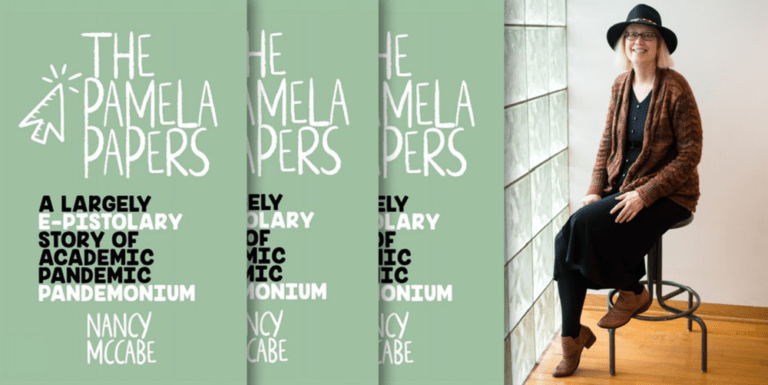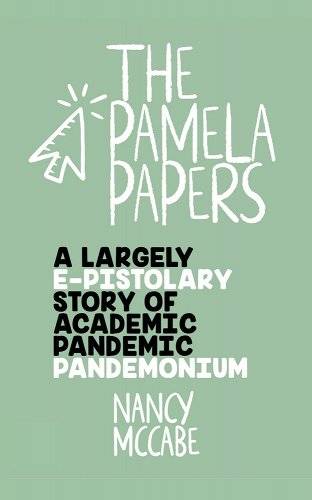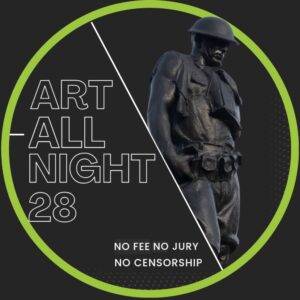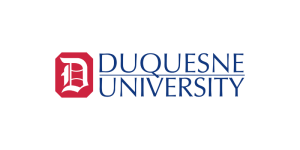“I can count on one hand great comedic academic novels. The Pamela Papers is one of them. This handful of email/Zoom scenes add up to a hilarious, absurd, and realistic interpretation of the educational experience in general, and small colleges in particular. Oh how weird things become, during the pandemic.”—George Singleton, author of The Curious Lives of Nonprofit Martyrs
“Like Black Mirror and The Twilight Zone, Nancy McCabe’s latest book, The Pamela Papers, hits so close to life in our brave new world it’s hard to call it satire. Yet The Pamela Papers is a brilliant, timely, hysterically funny, disturbing, and poignant glimpse into university life during and after the pandemic. . . . The world of The Pamela Papers is, in short, bonkers. McCabe is devoted to telling the truth about academia and the capitalist, anti-intellectual, anti-human fires that are unjustly raging there. This is a book of and for our strange times.”—Lori Jakiela, author of They Write Your Name on a Grain of Rice
More info From the Publisher: “Pamela Pankhurst is a beleaguered creative writing professor at Sanford Liberal Arts College (SLAC, home of the Slackers) when the pandemic hits, her campus shuts down, and a passive-aggressive new administration with draconian policies takes over.
As her coworkers lose their will to live and the institution careens toward catastrophe, Pamela bands with two colleagues to investigate: who are these administrators who make nonsensical demands and seem to harbor vendettas against everyone? Pamela and her intrepid workmates risk their careers and their sanity as they seek to rescue their campus from dehumanization and certain ruin…”
Author Site About the Author: Nancy McCabe is the author of eight books, most recently the young adult novel Vaulting through Time, with a ninth, the middle grade novel Fires Burning Underground, forthcoming in 2025. Her previous work includes the memoir in essays Can This Marriage Be Saved? and the reading and travel memoir From Little Houses to Little Women. She’s the recipient of a Pushcart and a PA Council on the Arts fellowship. Her work as been recognized ten times on Best American notable lists. She directs the writing program at the University of Pittsburgh at Bradford and teaches in the low-residency graduate program in creative writing at Spalding University. The Pamela Papers will be released in February by Outpost 19.
The book is written in the form of a variety of documents—e-mails, Zoom chats, a resume, a word cloud, accreditation guidelines, Pamela’s to-do lists, a project proposal, and a screenwriting assignment. Why did you choose this method of telling the story?
Like many colleagues in many professions, even those of us who were lucky enough to be able to work from home, I found myself very stressed during the pandemic by the many confusing and seemingly contradictory demands of my job. I felt isolated and disconnected and frustrated with the potential of that situation for workplace abuse. So I did what I always do—I wrote about it.
I’m a big fan of popular academic satires such as Rick Russo’s Straight Man, Julie Schumacher’s Dear Committee Members, and James Hynes’ Publish and Perish. Schumacher’s book is told through letters of recommendation. Inspired somewhat by that, I began composing fake e-mails exaggerating real life to highlight things that felt ridiculous. And then I tried to figure out how the entire story might be told through a variety of documents. It was a fun distraction, something that could be written in bits and pieces between Zoom classes and meetings.
What part was played by real-life events?
The story was initially based on real pandemic phenomena at my institution, though it departs radically from real-life events. The technology that enabled us to do our jobs also had the power to speed up the dehumanization of the workplace. In addition, my own institution experienced massive upheaval with new administrators, and friends at other academic institutions as well as those in a variety of other industries faced demoralization and burnout. But while some of the events were inspired by real life, the story itself departs from it radically, and almost all of the characters are composites and inventions.
What messages were you hoping to convey through this story?
Academia particularly lends itself to satire—drawn to it often by idealism, optimism, and a belief in the power of education, many find that a culture created by flawed human beings can seem irrational, egotistical, and jarringly out of keeping with the values we purport to hold. We give lip service to ideas like diversity and humanity but often fail to live up to those values. In addition, I wanted to comment on the way universities are viewed by the outside culture, as hotbeds of overboard progressivism—something that is not at all true to my experience of smaller campuses.
How does your work on the health benefits of writing inform your process?
I teach courses related to writing as a healing art; I’m particularly interested in the intersections between artistically sound practices and psychologically (and physically) beneficial ones. Many students I work with write about trauma—often very serious topics—but we also talk about the importance of finding joy and humor in our experience or outlook. In the case of The Pamela Papers, I found solace in poking fun at things that were making me stressed and anxious. It was gratifying and validating to borrow from seeds of real life and exaggerate it to highlight the ridiculousness of our situation, giving me distance and perspective.
I found myself looking forward to the process, and when I was most stressed, I could turn to my manuscript and immediately start laughing. So there I was in a little corner of my house, between Zoom sessions, giggling as I wrote and rewrote and edited. And as word got out about what I was doing, colleagues sent me ideas for the story and suggested edits and adjustments. It became a way to bond during a time when we all felt isolated.
Eventually, though, as things on our campus stabilized, some colleagues advocated for putting the trauma behind us and moving on. But for many, passion for their work and confidence in its value had been depleted. They were discouraged, in many cases burnt out; those long-term effects don’t magically resolve. They linger despite our best efforts. I hope that laughing at these experiences prove cathartic for others as it did for me.
Since you write in many different genres, how do you decide which one is right for your material?
I focused on fiction as a young writer and through my MFA and PhD programs. But then I turned to nonfiction, because disguising some more autobiographical events as fiction took away their power.
I’ve gradually come back to fiction over the years—in a ghost story novel from a few years ago, in a time travel novel for young adults, Vaulting through Time, released last summer, in my middle grade novel, Fires Burning Underground, that’s forthcoming and has potentially supernatural elements, and in The Pamela Papers. In all of these cases, I wanted to be able to move away from the real-life events that inspired them, add drama, and include in some cases fantastical elements, so fiction was the obvious choice.
But because of the collaborative aspect of the process, I didn’t want to have a traditional release party. So I turned to a new genre—dramatic writing—and adapted an excerpt into a play. Some colleagues will be performing it on our campus in March. I’m working on potential other performances as well. I love the process of continuing to pool our ideas and being able to laugh at things that once stressed us out. So in this case, a collaborative genre seemed like the right choice.
Can you share a brief excerpt from the novel?
From: Charlotte Smith Andrews, VPAA
Mon 5/18/2020 1:00 AM
To: SLAC Faculty
Subject: Pandemic Course Prep
Dear Faculty,
In the Fall, we will be adopting what I have named the SLAC Hy Flex Turnonadime Vacillating ZigZag Seesaw Method of Course Delivery, hereafter referred to as the HFTVXSMCD. Our watchwords will be Adaptability. Elasticity. Fluidity. Changeability. Versatility. Pliability, Variability (AEFCVPV). In other words: faculty should be prepared to be all things to all people.
Do keep in mind that students may choose how they wish to engage in their coursework. They may elect to attend in person, remotely, fully online, and any combination of these or none at all. They may choose to engage by disengaging, they may wish to spread across several classrooms for the sake of social distancing and you will need to figure out how to be in all of the rooms at once, they may choose to engage in nature, in the woods, on the trail, from other states, with or without stable technology, with or without cameras or mics, with or without quizzes, papers, or class discussions. By Friday, May 22, please submit a 30-page single-spaced plan detailing how you will accommodate each of these scenarios.
Please also be sure to record all of your lectures and caption everything that you record. Remember that due to privacy concerns, you must blur the faces and scramble the voices of any students who appear in your recordings. If you have privacy concerns of your own, you may apply for permission to blur your own face and scramble your own voice.
To accommodate all learning styles, please post recorded remarks for auditory learners as well as videotaped versions for visual/auditory learners. In addition, you will need to set your recorded lectures to familiar tunes for musical learners, translate them to algebra for logical and mathematical learners, and create scratch and sniff versions for sensory learners.
Please immediately send your chair a message with information about the instructional modalities that you prefer so that that information can be communicated to students, who may choose alternate instructional modalities instead. We have three months to make this crucial transition. If you work steadily for ninety hours each week over the summer, I believe that you will be fully prepared. You got this!
Charlotte
The Pamela Papers will be available wherever books are sold and on Bookshop.org.


























